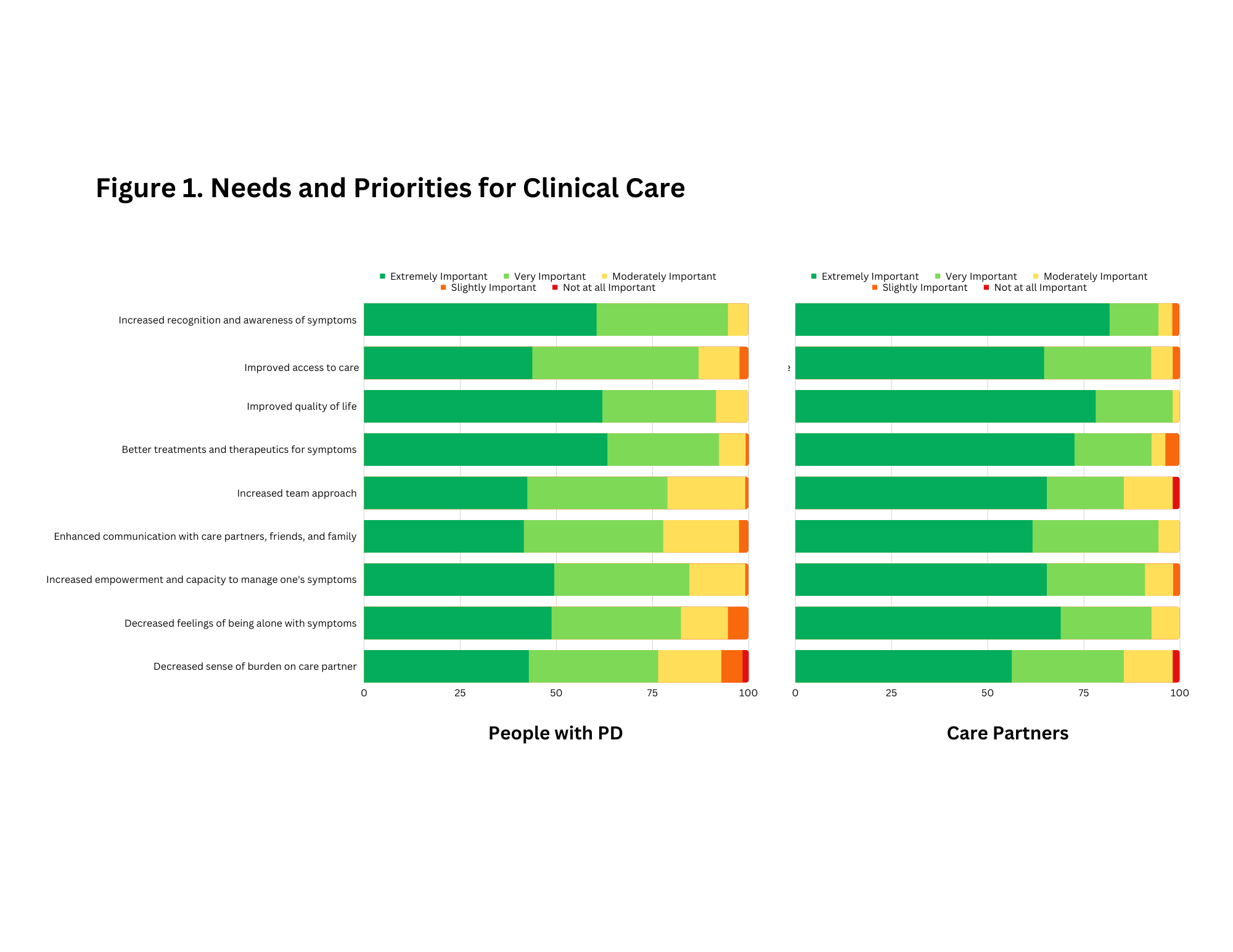Category: Parkinson's Disease: Non-Motor Symptoms
Objective: To examine the experiences of people with Parkinson’s disease (PD) and care partners (CPs) regarding cognitive, mood, behavioral, and sleep issues.
Background: Neuropsychiatric symptoms (NPS) are frequent in PD, leading to reduced quality of life, caregiver burden, and poor outcomes. Despite this, NPS remain under-recognized and under-treated.1, 2 Learning from the “patient voice” about NPS topics is critical to address gaps and improve clinical care, education, support and research on NPS issues.3
Method: We developed a survey with input from focus groups of people with PD and CPs. Survey questions, with Likert-scale, ranked items, and free text responses, assessed knowledge of and attitudes towards clinical care, education, support, and research related to NPS. The survey was administered online via REDCap to adults in the U.S. who had PD or were CPs of those with PD. Data was analyzed using descriptive statistics and comparisons between PD and CP responses.
Results: The survey was completed by 210 respondents (72% PD, 28% CPs). The majority were ages 50-79 (90.1% PD, 84.7% CPs), Caucasian (80%), but with greater females in the CP group (81.4% vs 47.3%). Concern regarding cognitive and mood changes was rated significantly higher by CPs than people with PD (p<0.001). The comfort level for discussing cognitive changes was lower in CPs than those with PD. Compared to people with PD, CPs were more likely to rate the following care needs as “extremely important:” increased recognition of NPS, team approach, and communication; improved access to care and quality of life; and decreased loneliness and sense of burden. Care partners were more likely to express interest in learning about NPS in advanced stages; having education for symptoms, effects on relationships and quality of life, advanced care planning, and stigma reduction; and gaining support through music and arts therapies. Research on cognitive and behavioral changes, along with understanding mechanisms and experiences, were more likely rated as “extremely important” by CPs.
Conclusion: Both people with PD and CPs view cognitive, mood, behavior, and sleep issues as important unmet needs. However, CPs favored cognitive and behavioral issues as priorities and expressed a stronger sense of urgency in addressing gaps in NPS diagnosis, and management. Inclusion of the “patient voice” is essential for advancing care and research for NPS.
References: 1. Aarsland D, Kramberger MG. Neuropsychiatric Symptoms in Parkinson’s Disease. J Parkinsons Dis. 2015;5(3):659-67. doi: 10.3233/JPD-150604. PMID: 26406147.
2. Weintraub D, Aarsland D, Biundo R, Dobkin R, Goldman J, Lewis S. Management of psychiatric and cognitive complications in Parkinson’s disease. BMJ. 2022 Oct24;379:e068718. doi: 10.1136/bmj-2021-068718. PMID: 36280256.
3. Goldman JG, Vernaleo BA, Camicioli R, Dahodwala N, Dobkin RD, Ellis T, Galvin JE, Marras C, Edwards J, Fields J, Golden R, Karlawish J, Levin B, Shulman L, Smith G,Tangney C, Thomas CA, Tröster AI, Uc EY, Coyan N, Ellman C, Ellman M, Hoffman C, Hoffman S, Simmonds D. Cognitive impairment in Parkinson’s disease: a report from a multidisciplinary symposium on unmet needs and future directions to maintain cognitive health. NPJ Parkinsons Dis. 2018 Jun 26;4:19. doi: 10.1038/s41531-018-0055-3. PMID: 29951580; PMCID: PMC6018742.
To cite this abstract in AMA style:
J. Goldman, H. Peirce, D. Merkitch. Needs and priorities of people with Parkinson’s and care partners regarding neuropsychiatric symptoms [abstract]. Mov Disord. 2023; 38 (suppl 1). https://www.mdsabstracts.org/abstract/needs-and-priorities-of-people-with-parkinsons-and-care-partners-regarding-neuropsychiatric-symptoms/. Accessed January 1, 2026.« Back to 2023 International Congress
MDS Abstracts - https://www.mdsabstracts.org/abstract/needs-and-priorities-of-people-with-parkinsons-and-care-partners-regarding-neuropsychiatric-symptoms/

